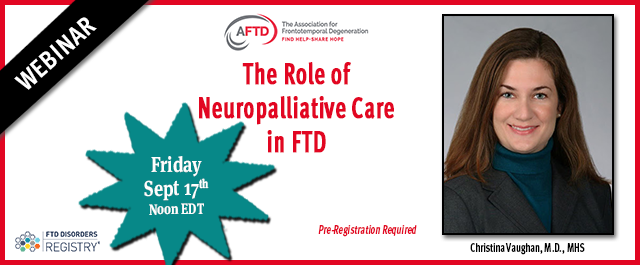PRESS & NEWS
Webinar: The Role of Neuropalliative Care in FTD – September 17, 2021

Neuropalliative care and its role in managing FTD symptoms and improving quality of life will be the topic of a webinar to be hosted by The Association for Frontotemporal Degeneration.
Neuropalliative care and its role in managing FTD symptoms and improving quality of life will be the topic of a webinar to be hosted by The Association for Frontotemporal Degeneration on Friday, September 17, 2021. The 90-minute webinar will begin at noon Eastern Daylight Time (9:00 a.m. Pacific).
Christina Vaughan, MD, MHS, of the University of Colorado (UC), will discuss the difference between palliative care and hospice, and explain the role both play in comprehensive care of persons diagnosed with frontotemporal degeneration (FTD). Dr. Vaughan will also explain how families and persons diagnosed with FTD can access neuropalliative care.
Neuropalliative care is a new and growing field within neurology that focuses on improving the quality of life of patients with serious neurologic illnesses. It centers on the physical and mental management of neurological conditions, while offering support to the family, friends and caregivers who are affected by the patient's diagnosis and prognosis.
This webinar will explain:
- how to differentiate palliative care from hospice
- the benefits of neuropalliative care
- how neuropalliative care can help those diagnosed with FTD and their families
- when to access neuropalliative care
Watch a replay of the webinar below.
Christina Vaughan, MD, MHS
Dr. Vaughan is an associate professor of neurology and medicine at the UC’s Anschutz Medical Campus and chief of the Neuropalliative Care section. She completed medical school in her hometown at the State University of New York at Buffalo and did a neurology residency at the University of Pittsburgh, Pennsylvania.
Having grown up with two immediate family members living with neurodegenerative disease, Dr. Vaughan chose to pursue fellowship training in movement disorders, which she completed at Rush University in Chicago. She joined the faculty of the University of Colorado (UC) in 2017. She has six neuropalliative clinics per week where she sees patients with a multitude of chronic neurologic diseases. She also attends the inpatient Palliative Care service at UC Health Hospital.
In her role as clinician-educator, Dr. Vaughan instructs all levels of medical training and participates in several clinical research projects. She assesses the unique palliative care needs in populations such as those with young-onset dementia, including FTD.
Together we can find a cure for ftd
The FTD Disorders Registry is a powerful tool in the movement to create therapies and find a cure. Together we can help change the course of the disease and put an end to FTD.
Your privacy is important! We promise to protect it. We will not share your contact information.



